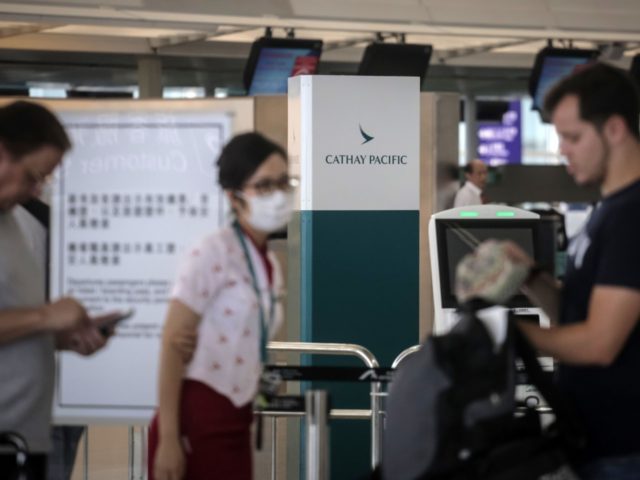Employees of Hong Kong’s Cathay Pacific airline on Tuesday described a “white terror” gripping the company as the Chinese Communist Party forces a purge of staffers who support the Hong Kong Protest movement, a campaign that has already ended the careers of several pilots, top executives, and CEO Rupert Hogg.
Employees described a company in “turmoil” to Reuters as protest sympathizers are fired or pressured into resigning. One aircrew member described a campaign of intimidation that makes employees “really scared to talk political stuff, even for chit-chat.”
“Some of the pro-Beijing people set up a Telegram group and post our personal information, like our addresses, phone numbers, if they discover that we support the movement on our own social media,” the employee said. Telegram is a secure messaging application used for private conversations by both pro- and anti-Beijing people in Hong Kong.
Comparisons to the “White Terror,” a vicious political purge beginning in the late 1920s where the victims were Communists, have been made by dismayed Cathay employees.
Reuters obtained a memo from Hogg’s replacement as CEO, Augustus Tang, that let Cathay employees know their conduct will be carefully monitored.
“Right now, we are one of the most watched companies in Hong Kong and indeed the world. The way every single one of us acts, not only at work serving our customers but also outside work – on social media and in everyday life – impacts how we are perceived as a company,” Tang’s memo said.
Much of the pressure against Cathay comes from other corporations, not all of them Chinese state-run enterprises, that have announced boycotts of the company for business travel because its employees were seen as sympathetic to the protest movement. The airline’s chief tormentor is the Civil Aviation Administration of China (CAAC), which has gone far beyond air safety and launched intrusive political background checks on air crews before allowing them into Chinese airspace.
“Inspectors are checking the phones of the pilots and cabin crew, going so far as to check their WhatsApp messages and photo albums to see if there are any anti-China materials,” a pilot told Reuters.
“If some tourists ask me about things happening in Hong Kong, I will only tell him some factual information, being neutral. I don’t want somebody to use it as an excuse to complain about me – Chinese tourists are everywhere,” a flight attendant said.
The political purge appears to be working, as Reuters reported many Cathay employees seem to understand the airline must “please China,” as one of them put it, or the company will not survive. A user on one of the Facebook pages run by Cathay employees encouraged others to “be silent and continue compromising” in order to save their jobs.
“The company has to bend over to survive unfortunately, but we don’t have to. We must unite more than ever to help regain public trust. If we don’t, all 27,000 of us might be out of a job,” another employee argued.
Former CEO Rupert Hogg appears to have embraced that spirit of resistance. Hogg’s departure was polite and professional, but since then he has become a hero of the protest movement and a celebrity in Taiwan, to the point where poems are being written about his defiance of Communist tyranny.
As Taiwan News reported on Monday, Hogg was forced out at the insistence of the Chinese Communist Party, which used its tightly-controlled media to announce his departure half an hour before Cathay Pacific did. He resigned on August 16 because the Chinese civil aviation authority demanded Hogg submit a list of all airline employees who participated in the Hong Kong protests, and he responded by giving them exactly one name: his own.
CNBC observed that Cathay is particularly vulnerable to Communist pressure because one of its major investors is a Chinese state-owned company, Air China, and the airline’s operations are heavily dependent on maintaining access to Chinese airspace, even when flights are destined for airports in other parts of Asia and Europe.
“Companies may find that their employees’ activism turns into a political risk in mainland China, if this campaigning becomes associated with the firm’s brand,” warned Duncan Innes-Ker, Asian regional director of The Economist Intelligence Unit.
“The recent events at Cathay Pacific show that Beijing is willing and able to use its economic power to demand high-level personnel changes way outside its normal remit, at a private company that is not headquartered in mainland China,” noted Ben Bland of the Lowy Institute.
The South China Morning Post on Monday noted investors are once again bullish on Cathay Pacific after some early panicked selling, with the exception of a few analysts linked to Chinese state-run banks who are probably signaling the Communist Party’s disapproval by giving the stock low ratings.
As of Monday, the only major analyst issuing a “sell” recommendation on Cathay stock was ICBC, the research arm of China’s state-owned Industrial and Commercial Bank of China. In a bitter twist of fate, the airline is widely judged an attractive investment because of the work Rupert Hogg did over the past two years to turn it around.
“If protests end before October, as expected, Cathay’s stock price and valuation will probably recover gradually in the rest of this year,” said Alan Li of Atta Capital, referring to the widely-held belief that China will not allow the protests to continue beyond the upcoming anniversary of the founding of the People’s Republic.

COMMENTS
Please let us know if you're having issues with commenting.